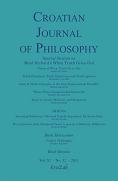When (True) Disagreement Gives Out
When (True) Disagreement Gives Out
Author(s): Isidora StojanovićSubject(s): Philosophy
Published by: KruZak
Keywords: disagreement; relativism; contextualism; predicates of personal taste; gradable adjectives; perspective; value judgments
Summary/Abstract: In this paper, I take issue with the proposal put forward by Mark Richard in When Truth Gives Out (2008) concerning disputes over issues such as who is rich, what is cool, and other issues of similar ilk. Richard holds that the parties in the dispute can truly disagree on whether a given person is rich, but can be both right, if we assume that they have different standards of wealth. Disputes over what is cool are, according to Richard, trickier, since they can give rise to cases of faultless disagreement in which the two parties disagree, and neither party is wrong, but neither party is right either! My first goal in this paper will be to show that the distinction between the two types of disagreement, as drawn by Richard, is not well motivated. I will also argue that if he were right about the stronger case (disagreement in which both parties are right), his own account would fail to capture it. He can capture either the idea that they truly disagree, or the idea that they are both right; but he cannot both have his cake and eat it, too. My second goal will be to bring to the foreground some constructive aspects of Richard’s proposal, and in particular the idea that such disagreements involve concepts whose application is not fully determined and whose usage is open to accommodation and negotiation (to use Lewis’s terms, as used by Richard). If we accept that on some occasions, whether a concept applies to a given instance or doesn’t is not yet settled, then arguably there are cases in which neither party is wrong—at least at the time of the dispute. I argue that their disagreement can be genuine only to the extent that it will eventually be settled whether the concept is to apply to a given instance or not, hence the way in which the concept gets shaped up and extended through its future uses makes it possible to determine, retrospectively, which of the two parties got it right. If this is correct, then the putative cases of faultless disagreement really turn upon the openness of the future: what makes them “faultless” is, simply, that there isn’t any matter of fact yet whether the one or the other party is right.
Journal: Croatian Journal of Philosophy
- Issue Year: XI/2011
- Issue No: 32
- Page Range: 183-195
- Page Count: 13
- Language: Croatian
- Content File-PDF

